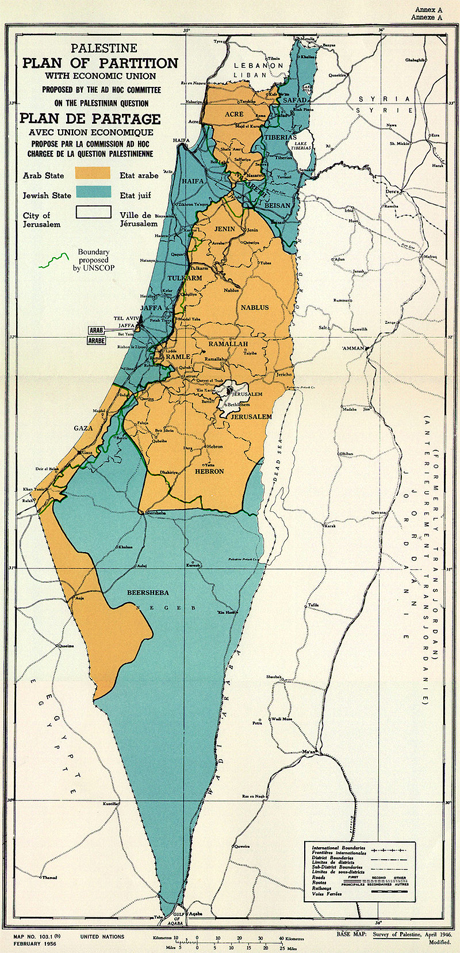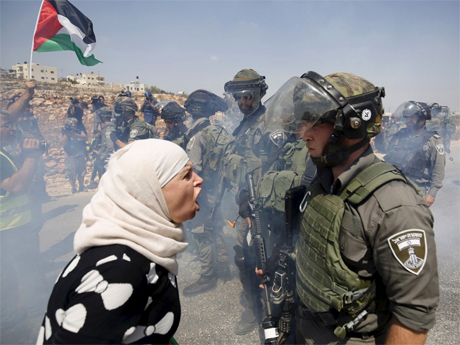Palestinians around the historic territory of Palestine have marked the 68th anniversary of their expulsion from their homeland – called the Nakba, or catastrophe - at the hands of Zionist militias during the 1948 war.
On Sunday, thousands of Palestinians in territories occupied by Israel in the 1967 war - the West Bank, Gaza Strip and East Jerusalem - in addition to Palestinian refugees around the world held protests and memorials to commemorate the event and demand the Right of Return.
On Thursday, Arab Palestinians in Israel, who were not expelled from their land during the 1948 war that established the state of Israel, marked the anniversary with protests inside the Green Line.
In November 1947, after years of escalating tensions, the United Nations issued Resolution 181 that partitioned Palestine between the Palestinians and Jewish settlers.
The infamous resolution allotted Jews 55 percent of historic Palestine to establish a state despite the fact that Jewish settlers made up less than 30% of the area’s total population.
Palestinians, who made up 70% of the population, were ordered to live on less than 45% of the land, a travesty they rejected.

Map of UN Partition Plan for Palestine, adopted 29 Nov 1947, with boundary of previous UNSCOP partition plan added in green
Zionist militias declared the creation of the state of Israel on 15 May, 1948.
The militias used terror tactics and perpetrated massacres to displace some 800,000 Palestinians from their lands.
For almost seven decades, the Nakba has continued to remind Palestinians and their supporters around the world of gross injustice they insist must be rectified.
The Zionist movement, backed by Britain - which ruled Palestine 1919-1948 - managed by force of arms to seize the greater part of Palestine and then declared the establishment of Israel.
In 1967, Israel captured the rest of historic Palestine in what it calls the Six Day War.
On the occasion of the 68th anniversary of the Nakba, the Palestinian Ministry of Foreign Affairs said that the Palestinian people "confirm every year that the memory [of the tragedy] is still alive and has not died with the passing of many who lived through the Nakba."
In a statement on Sunday, the ministry said the Palestinian people are still paying a heavy price for the partition of their land, asserting that "what is happening today to the Palestinians who remain steadfast on their land is no less important in terms of substance or severity than what the same people suffered through the 1948 Nakba generations before."

A Palestinian woman argues with an Israeli policeman during a protest against Jewish settlements in the West Bank village of Nabi Saleh, near Ramallah September 4, 2015 (Reuters)
The ministry added that the international community, which deliberately or unintentionally neglected and ignored the 1948 Nakba, knows the price Palestinians and the whole region surrounding Palestine had to pay in terms of instability.
The Palestinian Central Bureau of Statistics said on Sunday that the number of Palestinians multiplied nearly nine times since 1948.
The bureau said in a statement released on Sunday that "the number of Palestinians living throughout the world reached about 12.4 million people by the end of 2015, meaning that the number of Palestinians multiplied 8.9 times since the events of 1948 Nakba."
The statement estimated that 1.4 million Arab Palestinians continue to live inside the 1948 borders in 1300 villages and towns.
Four million Palestinians live in the occupied Gaza Strip, West Bank, and East Jerusalem.
The remaining Palestinians live in the diaspora as refugees in Arab countries and around the world.
The bureau also estimated that the number of Palestinians who were not forced out of their homes in 1948 was about 154,000.
"Some 800 thousand Palestinians had been displaced from their villages and towns to the West Bank, Gaza Strip and neighboring Arab countries,” the statement said, adding that “thousands of Palestinians were locally displaced from their homes, even though they stayed within the 1948 borders which remained under the Israeli control."
The bureau also noted that "documented data indicates that the Israelis, during the Nakba, seized 774 Palestinian villages and towns, razing 531 of them to the ground."
"The Israeli forces committed more than 70 massacres against the Palestinians and killed more than 150,000 Palestinians during the Nakba."
The number of Palestinians who currently live in historic Palestine - between the Jordan River and the sea - reached about 6.2 million people at the end of 2015.
The statistics show that about 28.7 percent of Palestinian refugees live in 58 camps, of which ten camps are located in Jordan, nine in Syria, 12 in Lebanon, 19 in the West Bank and eight in the Gaza Strip.
The 1993 Oslo accords, which were formally intended to find a peaceful two-state solution to the decades-old conflict, failed to secure the creation of a Palestinian state alongside Israel.
Israel continues to build settlements across the occupied West Bank, which currently house more than 500,000 settlers, leaving short-term prospects for a two-state-solution less than dim.
In 2005, Israel unilaterally pulled ground troops out of the Gaza Strip, but continued to enforce a ground, air, and sea blockade on the 1.5 million Palestinians living there.
*Mostafa Ali contributed to this report
Short link: